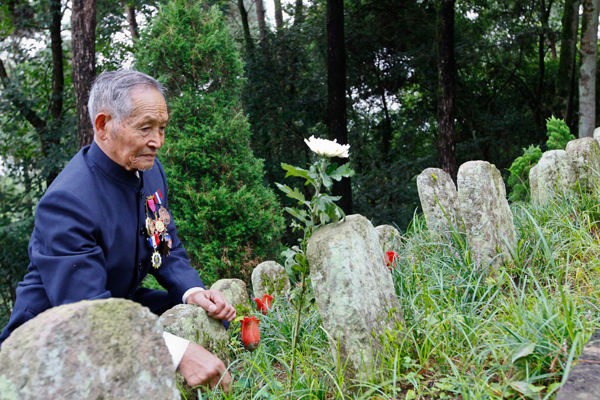The frequent visitor
 |
|
Lu Caiwen, a China Expeditionary Force veteran, often visits his fallen comrades at a memorial cemetery in Tengchong, Yunnan province. [Photo/Xinhua] |
The cemetery is now a major attraction and regularly draws large numbers of locals and tourists.
Every few days, CEF veteran Lu Caiwen visits the graveyard to lay chrysanthemums in memory of his fallen comrades. The 90-year-old graduate of the Whampoa Military Academy explained that the classmates who sat on his left and right were both killed in the war.
"I still miss them," he said.
Lu joined the Kuomintang army at age 16 after witnessing several atrocities committed by enemy soldiers in Tengchong. After enlisting, he was sent to a military training school in Dali, Yunnan, which had been founded by the Kuomintang National Government Military Committee, but was later merged with Whampoa.
"The training course was scheduled to last for three years, but because of the war it was shortened to 12 months. After graduation, I was sent to work for the 11th army's intelligence unit to collect information about the Japanese military deployments," he recalled.
While other people were trying to get as far away as possible from the Japanese, Lu and his comrades traveled in the opposite direction, often undertaking extremely hazardous missions.
"Once, we were assigned to investigate the conditions at a Japanese position near Longling county. We had drawn very close when we noticed a large number of Japanese soldiers. We were discovered by a patrol and fought at close range. Luckily I was uninjured," he said.
The intelligence work required a good brain and great courage.
"We were at our wits' end trying to assess the deployment of the Japanese in Tengchong, so we had no option but to interrogate a man who was suspected, correctly, of being a dangerous collaborator," Lu said.
As he prepared to enter the man's house, Lu realized he might not come out alive. "I was very nervous, but I forced myself to calm down. After quite a while, I persuaded him to hand over details of the current military situation by assuring him that we would protect him after the Japanese had been expelled from Tengchong," he said.
The interrogation proved far more successful than anyone had dared to imagine because the man provided a great deal of additional information in the days that followed, and Lu was promoted to lieutenant.
Having witnessed the horrors of war firsthand, Lu applied for a discharge after the relief of Tengchong, and spent the next four decades as a teacher, retiring in 1987.
"I don't hate the Japanese people, because many Japanese were also killed in the war. But I hate the Japanese government and its attitude toward the war," he said.
"It's a sign of real progress that the government has recognized our (the Kuomintang soldiers') contribution to the war against the Japanese. I hope the young people will remember history and learn to cherish peace."
Yang Wanli and Tang Yue contributed to this story.